
"Malek Means Angel": Award-winning documentary by Lea Hjort Mathiesen
“Malek Means Angel”
With the camera in her carry-on, Danish filmmaker Lea Hjort Mathiesen boarded a plane to Tunisia with a one-woman assignment to shoot a documentary in just one month. Her trip is part of IMS’ peer-to-peer programme for documentary filmmakers in Denmark and the Arab world
Leaving for Tunisia in 2014, Lea Hjort Mathiesen was part of IMS’ exchange programme that aims to strengthen the skills of individual filmmakers and create a network for filmmakers from the Middle East and Denmark. The exchange programme is a collaboration between International Media Support (IMS) and the National Film School of Denmark.
Coming home, she had the raw material for what became an award-winning documentary with the title “Malek Means Angel”. The film premiered at the prestigious IDFA Film festival in Amsterdam last year and has gone on to various festivals around the world, amongst these FIDADOC in Morocco and Universal Martial Arts Film Festival in France where it was awarded Best Documentary. In September it will be shown in theatres in Copenhagen as part of Buster Film Festival.
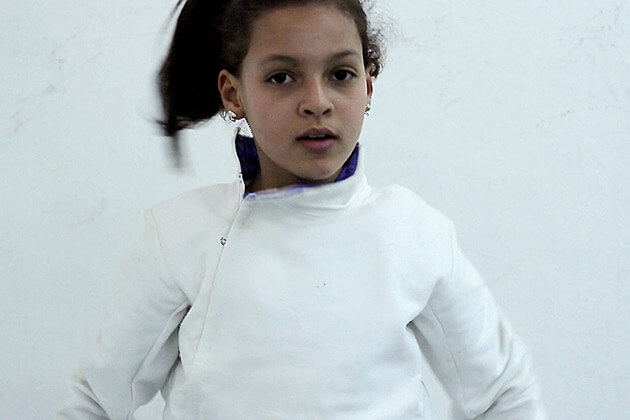
Malek: Growing from tomboy into a young woman 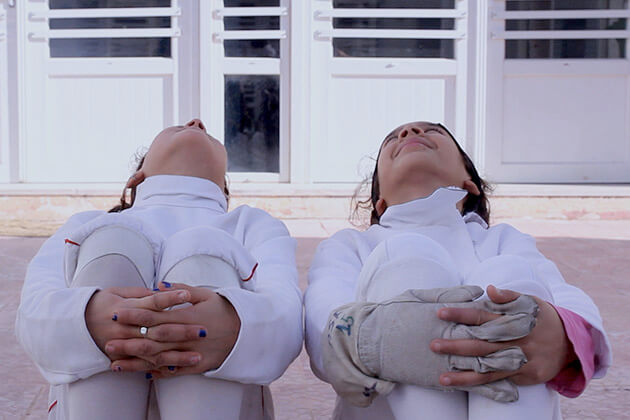
Malek and her best friend Yassmine looking up in the sky 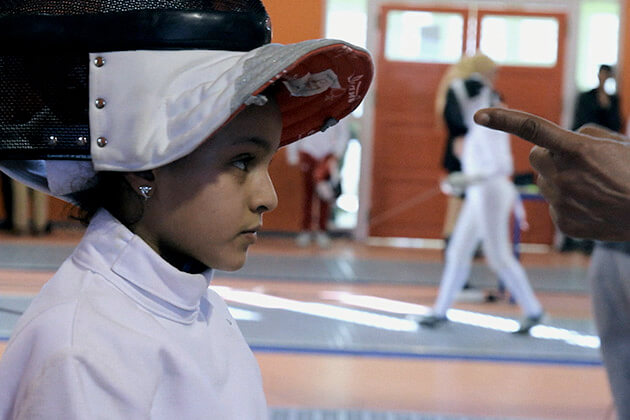
Malek listening to her coach Habib before participating in a fencing competition 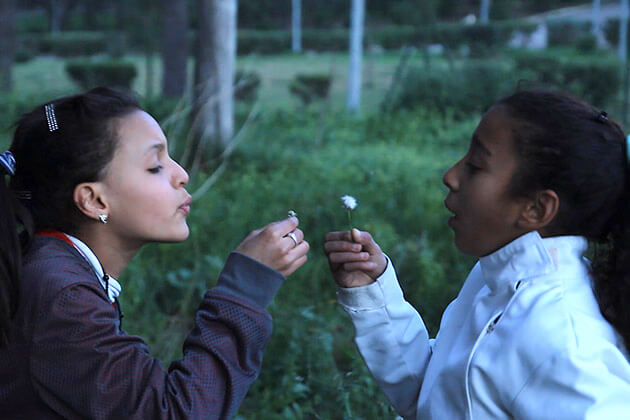
Malek and Yassmine playing 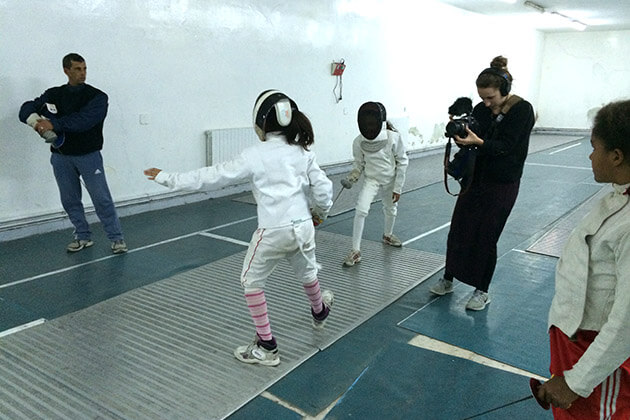
Lea Hjort Mathiesen filming during fencing practice
“The film portrays the time in life of when a young girl is about to become a teenager – growing from tomboy into a young woman,” Lea Hjort Mathiesen says.
“I was lucky to meet Malek, enabling me to paint a portrait of a girl in a Muslim dominated culture different from the one mainstream media usually hands us,” she continues.
The film is a documentary about 11 year old Malek, who dreams of becoming a professional fencer. Together with her best friend Yassmine, she goes to fencing class every day after school. But the fencing is not just a sport.
“To me the fights symbolise something more. One could see it as a preparation for life’s challenges in a broader sense. Knowing Malek, I see a young girl testing out gender roles,” the newly graduated filmmaker explains.
Finding Malek
The core of the IMS exchange programme is to send Danish students into for them unknown territory in the Middle East or North Africa for one month. At the same time, young documentary filmmakers from the Arab world come to Denmark to participate in a course at The National Film School of Denmark.

Lea Hjort Mathiesen was one of six Danish students who participated in the
programme. In Tunisia, she moved in with a local family in Tunis.
“I became part of the family from day one. They were very helpful in discussing the film with me and helping me find my way – on many levels,” she says.
One day the mother of the family brought Lea Hjort Mathiesen to a local swimming facility. There she saw a man preparing some swords for a fencing class. This man was fencing master Habib, who invited her to join the class with her camera.
“When I went over my footage in the evening, my very first recording was of this young girl who was not wearing a uniform, just a huge helmet on this tiny body. I’m sure you can picture this,” Lea Hjort Mathiesen laughs.
“She was fencing with the teacher, and when she took off her helmet, this expressive face appeared. I immediately realised there was something special about Malek.”
Although Malek was only 11 years old, language and age differences were never a problem when shooting the film.
“I think the best way to work with children is not to see them as children. I never spoke to Malek as if she was a child,” she says.
Lea Hjort Mathiesen characterises Malek as a girl with unusual amounts of charm and willpower. And as a girl who really felt at home in the eye of the camera.
“Film shooting is like a dance. You need people to dance with you. When people
want to dance with you, you’re able to make great films.”
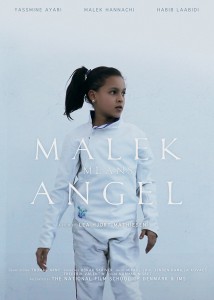
Creating impact
Lea Hjort Mathiesen hopes the exchange programme will have an impact on the media environment in Tunisia.
“I met Tunisians who were eager to make films themselves and I told them that all you really need is access to a video camera to start shooting. For one girl particularly this encouraged her to pursue her dreams in filmmaking. She sends me her work on a regular basis and I’m happy to see her developing her skills as a photographer.”
She also keeps a strong relationship with her local host family.
“I speak with the family on a regular basis and I’m hoping to return soon. Tunisia is experiencing an extremely exciting development these years, which I hope more people will become aware of.”
Lea Hjort Mathiesen hopes to get to shoot another film in Tunisia.
“I have been traveling in many different parts of the world, but Tunisia was special to me. It’s a unique melting pot of different cultural influences and eras meeting each other in the same place.”
Exchange programme “a building block” in personal development
Lea Hjort Mathiesen considers the exchange programme a key building block in her development as a documentary filmmaker.
“I have learned so much from this experience. Meeting people where you feel at ease regardless of language, time, place and culture is extremely inspirational when making documentary films.”
Lea Hjort Mathiesen emphasises the importance of having different parts of the world represented in her work.
“When travelling, I find you often get to meet people who, perhaps from the outside, are living a different life, but who I strongly identify with when it comes to values and personal qualities.”
Rasmus Steen, IMS Programme Manager, describes how the young filmmakers participating in the exchange programme build up relations to each other even though they come from different cultural backgrounds.
“I think they realise that they have so much in common as filmmakers. Focus is immediately on similarities instead of on differences. Within a couple of days, they figure out how to collaborate and benefit from each other. The world could certainly learn from that,” he says.
The exchange programme is part of IMS’ engagement in the documentary filmmaking sector in the Middle East and North Africa region. The aim of the programme is to create professional networks between Arabic, Iranian and Danish filmmakers. The programme is funded by the Danish-Arab Partnership Programme.
The article was written before the beach attack in Sousse, Tunisia, on 26 June 2015.




